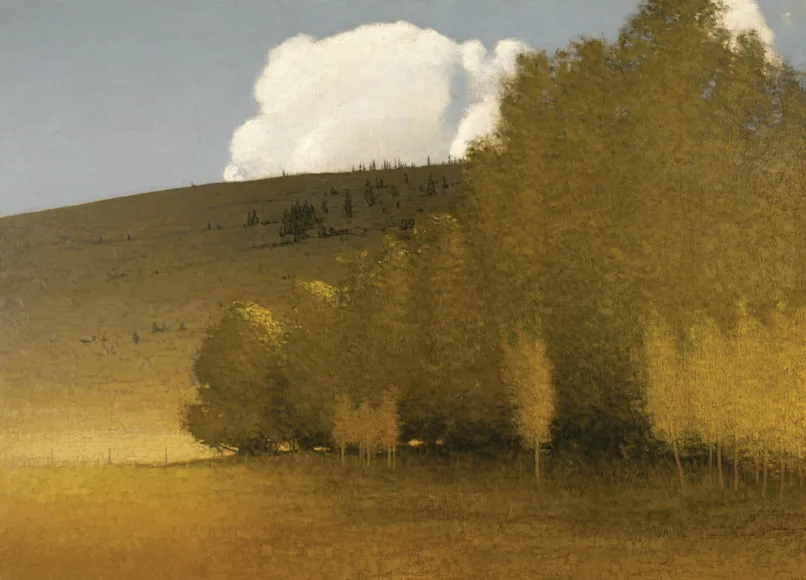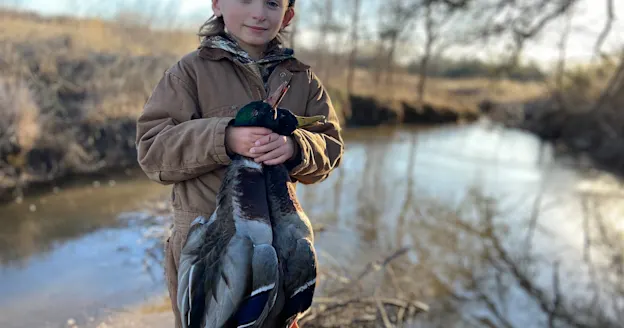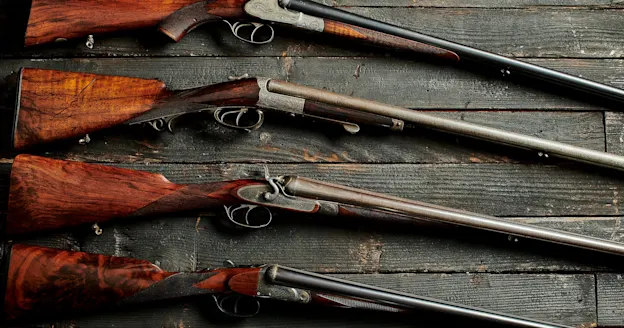This story first appeared in the July 2014 issue, five years before Russell Chatham’s passing, in 2019.
HE’S BIG, and while I didn’t have directions, I didn’t think it would be possible to miss him. The greatest living landscape painter in America, famous for his outlandish appetites for great food, wine, travel, art, music, literature, and the sporting life, including what some might label an obsessive relationship with fly fishing: Wherever he was located, no matter how rural and remote the location—somewhere north of San Francisco—people would know where he was.
There are few places a soul so large can hide.
I had the name of the town where he gathered his mail, Marshall, just a wide spot in the road. I thought it was all I would need.
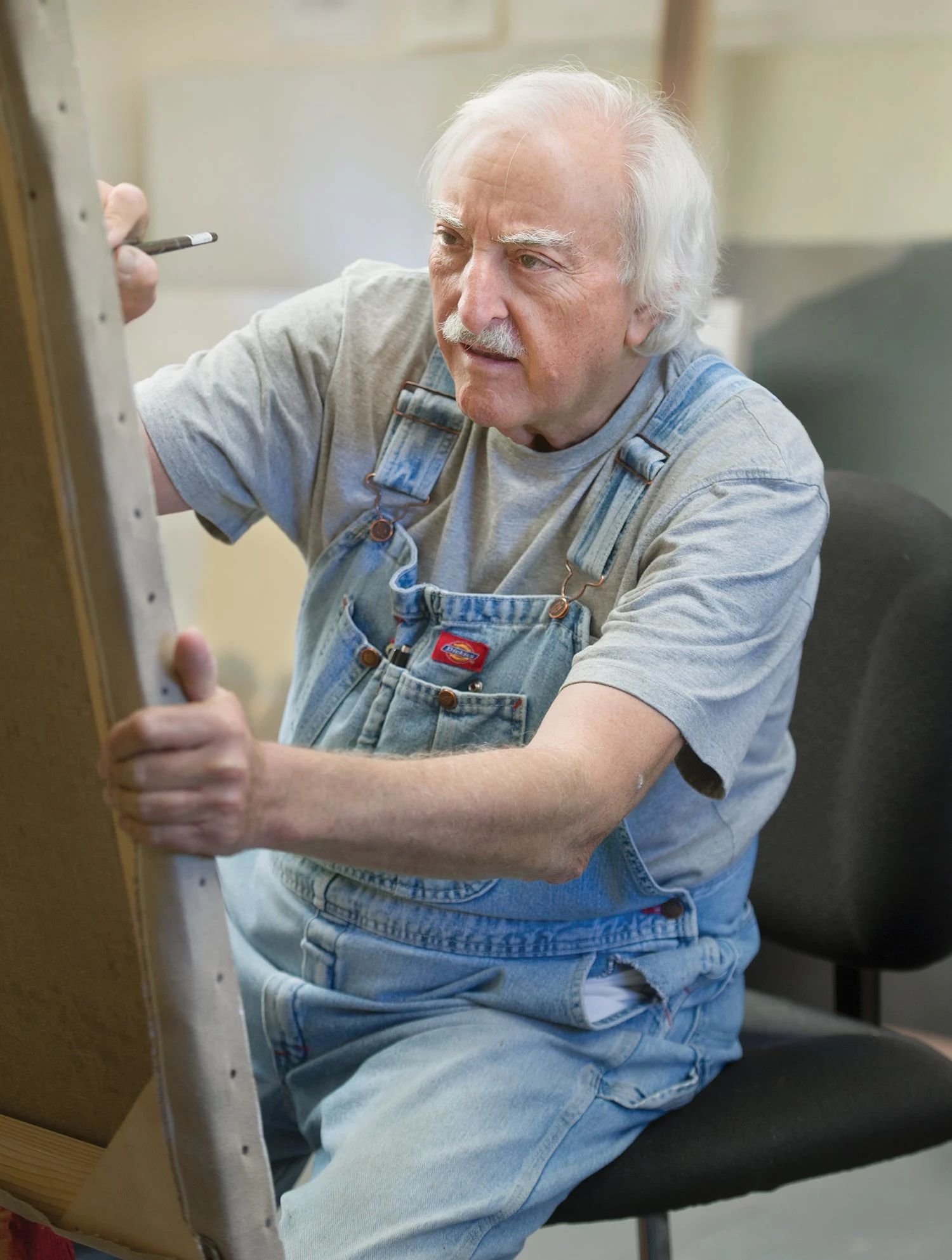
Chatham would spend a month working on a painting to get it perfect. Tim Porter
He’s moved back from Montana’s Paradise Valley to the place where he grew up; suddenly, somehow, he’s 74, painting as well as he ever has in his life, and with some new tender subtleties coming in, a luscious haze creeping into the cottonwood bottoms along the Yellowstone River and emanating from the mustard-yellow sunburned hills in which cattle graze and—cooling, at end of day—rising from the animal-like ridges that loom above Tomales Bay. But that’s beyond my ken. I’m here to see him as a friend and sportsman—for many years he held the world record for catching a striped bass on a fly—not as an artist. We’re going to eat. We’re going to catch up. I haven’t seen him in over 10 years, since back when we published a book together for one of his many ventures of enthusiasm, a publishing house (there was also a restaurant, a gallery, a lithography shop). A word that’s often used to describe his passions is volcanic. What’s it like to burn that hot, I wonder, and how does a person not ever run out of fuel?
He knew I was coming, but we hadn’t set any time. Just show up when you show up, he said. I made it to the town of his post office box about an hour before dusk. Dilapidated boats sat dry-docked, begging a painter; others were moored in the dark still waters, precise and just-so with all that was around them. The folks at the little bar and grocery didn’t know where he lived; the oyster farm proprietors knew he was in the area, and that he drove an old van—they’d seen it going up a certain road. An old woman out splitting wood beneath a stand of giant eucalyptus pointed me farther on. She didn’t know exactly where, but she had seen him in the post office and was glad he was back.
Another countryman directed me two farms ahead: getting closer. Chatham has always lived in magnificent viewscapes. The house I guessed at had a wide porch and fragrant rose arbor, with some of the blossoms as red as the inside of a fish’s gasping gills. No lights were on. I went inside, called Russell’s cellphone on the chance that he might be down in a town with cell service somewhere, searching for me.
He answered. “You’re calling from my home,” he said.
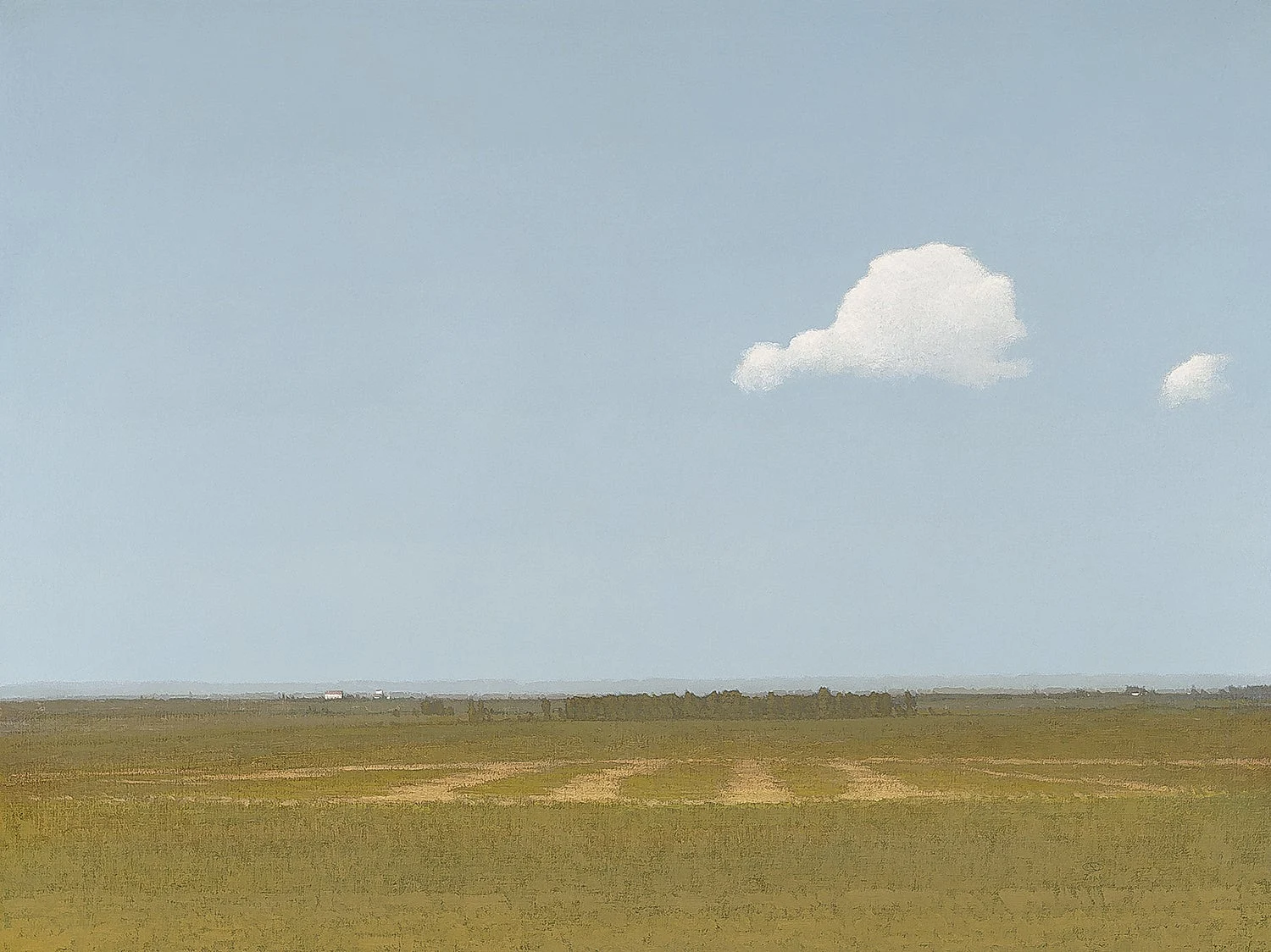
In Chatham’s Hayfields, a hunter can smell the grass—and feel the presence of pheasants. Courtesy of Russell Chatham
A Thousand Paintings, a Thousand Casts
I’ve been seated in his house for maybe 10 minutes, and he is already unscrolling, pure volcano.
“I give an honest response to landscapes,” he says. “I have it pass through me.” Like Tomales Bay and its tides, I think, or the push-pull seasons of Montana summer, Montana winter.
“I deliver a version that is still true—but it’s mine,” he says.
I think what he is saying is he doesn’t mean to shape or bend us; doesn’t need to convince or persuade us to see what he sees. He is just painting true to himself. And we follow.
His middle name may as well be nostalgia; his birthright is the elegy. He was but 5 years old when the man who was probably the most influential in his life, his grandfather, the famous Italian-American landscape painter, Gottardo Piazzoni, had a heart attack at breakfast with Russell one morning, pitching forward suddenly but managing to say, before he died, “Good-bye.”
Because of his grandfather, Russell carried a paint box and easel everywhere. He hunted quail and ducks and rabbits, and fished like a fiend. It was and still is the richest land in America, the fecund tidal sloughs delivering moon-gushing torrents of immeasurable nutrients. Back then, there were steelhead and silver salmon in those bays and creeks, lots of them, big ones, and he went after them, as well as the striped bass. And he painted. “By the time I was 19 I had painted a thousand paintings.”
My plan is to prepare a meal for him. But Russell tells me his neighbor is Evan Shively, one of the best chefs in the Bay Area, and thoughts of whatever simple offering I had in mind vaporize like a wisp of dry grass before a flame; and like a coward and a glutton both I say “O.K.”
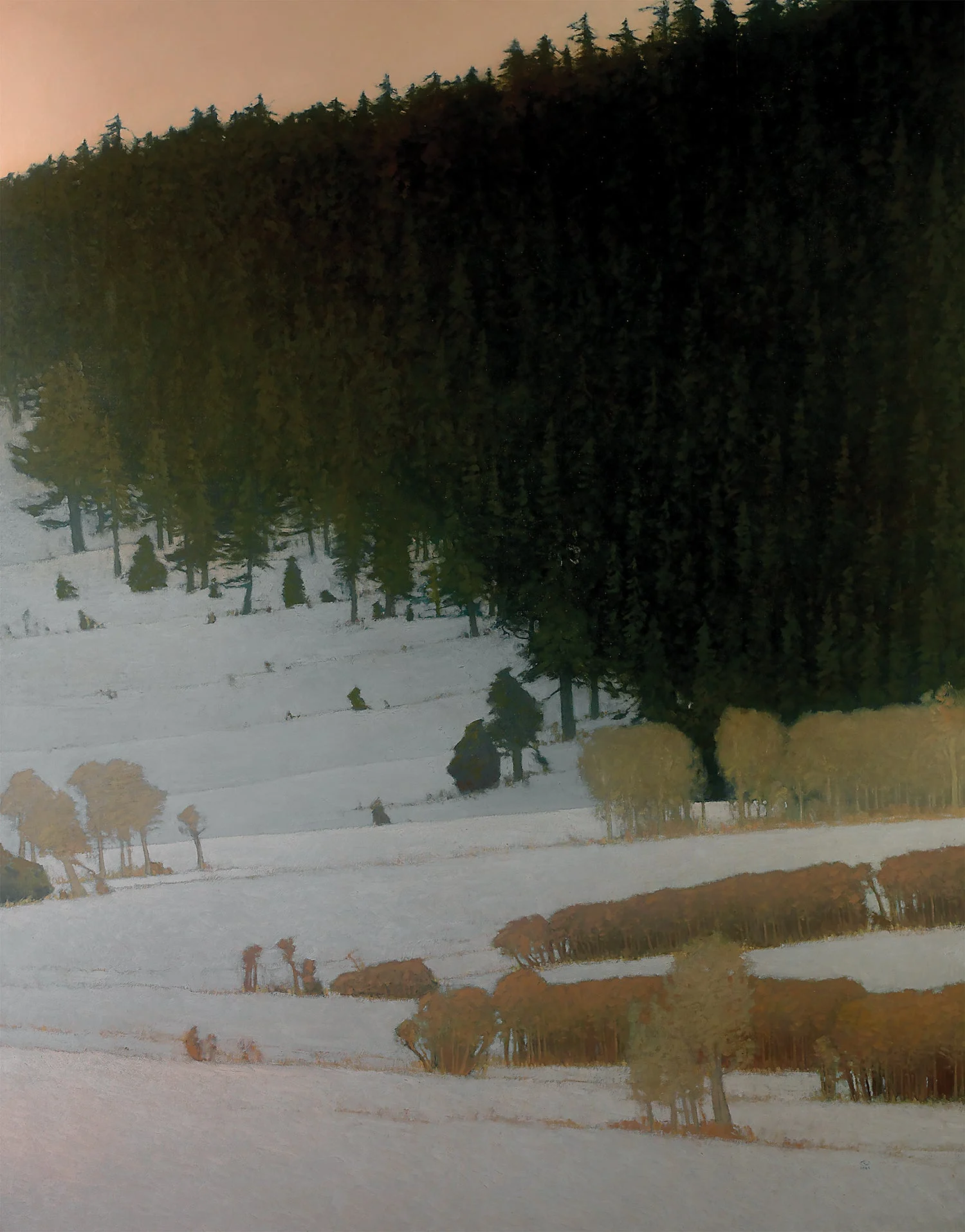
In Late Winter, Chatham captured the thin color—and thus the soul—of the season. Courtesy of Russell Chatham
We’ve been invited to Evan’s at seven o’clock sharp. Time for a story, though: When Russell was a teenager, his uncle took him to the Golden Gate Casting and Angling Club in the city, a baroque 1930s WPA project where casters practiced in silence, shooting their lines across the empty concrete pool, in which swimmers no longer swam. On the far side of the pool were bleachers where once spectators had viewed the piscine thrashings of their beloveds, but where now few if any sat, sometimes a few old men in fedoras, who came down to watch the casters and to kibitz: old fishermen, perhaps, or old men who were simply beguiled by the beauty of the silent ballet of the lines.
The old man wasn’t much of a teacher, and yet he was. He handed Russell a rod, told him that when he could cast the fly a hundred feet—all the way to the other side of the pool—he’d be a fisherman. Then he walked away.
“I went to that club every day,” Russell says. “It took me 10 years.”
When he did it, he didn’t even believe that he had, at first; it didn’t compute. He says he laid the rod down and walked around to the far side of the pool, where he found his fly, his line, resting behind the bleachers. It was a Sunday. There was no one watching.
“If those old geezers had been sitting there, I would have knocked their hats off,” he says.
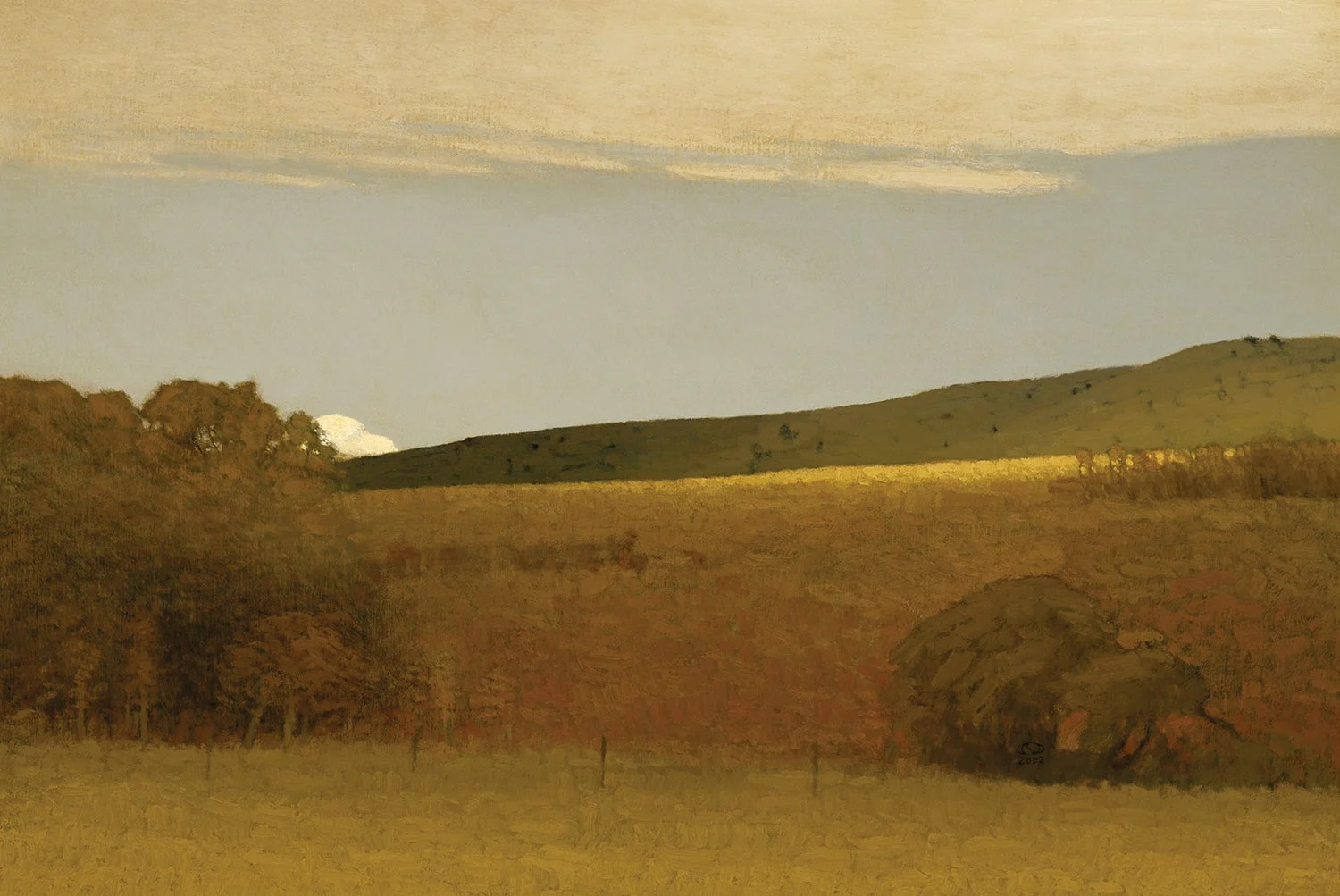
Patterson Ranch, III. Courtesy of Russell Chatham
Surf Stripers and Montana Winters
From the beginning, he loved to catch striped bass in the surf. Russell didn’t just want to catch more and larger fish, he wanted to get the ones that were thought to be beyond reach, and in the most challenging of conditions, the open surf. It’s one thing, he says, to drop a dry fly on a trout’s nose at 25 feet in a spring creek in Montana—there’s precision in that—but a fish’s nose remains a fish’s nose, and just because distance is involved in surf casting—presenting the fly to a fish at 50, 60, even 70 feet—does not mean that precision can be sacrificed.
“It’s a hell of a lot harder to be accurate at 70 feet than at 30,” Russell says, and that’s all he’ll say about it. His style is understatement, understatement, understatement; until sometimes—eventually—he’ll punctuate it with the explosive flourish that has been lurking below all along.
I ask him what it is he loves best about fishing for striped bass. He looks at me a little oddly. “They bite,” he says. “They’re a big, strong fish. They bite.”
He married young, had children—he has four children from three mothers—and kept painting, kept fishing. Time slid past. He moved to Montana in 1972, at the age of 32, back before it was the New West, but when an explosion of literary and other artists were converging on the freedom of those open spaces; and he remained there for nearly four decades before returning home in dire financial straits, despite the waiting list for his paintings, and the fact that even a small single piece sells for tens of thousands of dollars. He simply will not get in a hurry on a painting, is painstaking, a perfectionist, insistent upon getting lost—or found—in the work.
Chatham is a man of consistent, insistent, unrelenting passions, wreathed with paradoxes. He painted all throughout his youth—put in the requisite time of 10,000 hours—yet he says that when he moved to Montana he knew nothing about painting; had not yet learned how to paint. As with the casting, he had been painting relentlessly, following intensely in his grandfather’s magnificent steps. Even to a layperson, the similarities are visible: in the composition’s arrangement of curves, not necessarily voluptuous but graceful; in the brushstrokes, rich and dreamy, yet powerful; and in the most basic essence of a painting, the palette. It would be easy to consider that the penciled sketch underneath, and the wash below, are the dream, blueprint, and path of a painting, but that is like saying a dry riverbed is a river. The water is the real river. The color is the painting. The palette is the real dream.
“You can’t just do it for an hour a day, or on Saturday,” he says. “It’s not going to work.”
In Montana, the landscape was too vast, overwhelming. You could never get it onto one canvas. You could never get it. “I had to learn to get down in a gully and look up,” he says, speaking like a hunter settling into a good place to wait for his or her quarry. Another thing that rewired his great cetacean-like brain, or expanded new wiring ever further: “I’d never been in a winter before.” He’s not a fan of it anymore—and he acknowledges that’s one of the reasons he’s returned home.
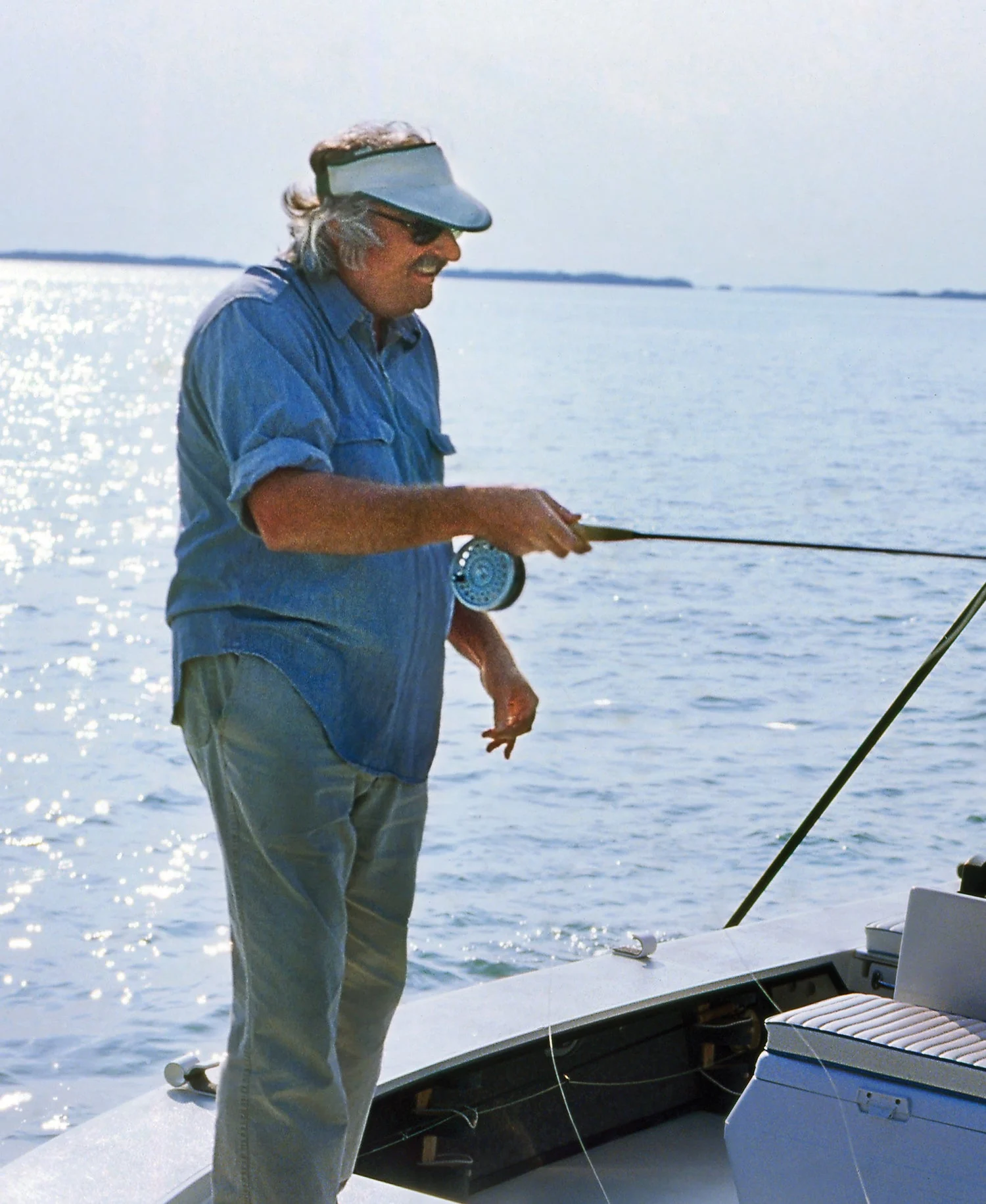
Chatham works a fly rod from a flats boat off Key West. Stephen Collector
I want to ask him if he’ll come back to live in Montana, the place he’s lived longest in his life—if only for the sunniest months—but I don’t want to know the answer. His gallery is here, a sweet little studio that looks out over the bay and tidal flats he fished when growing up.
“I didn’t play baseball, I didn’t play basketball,” he says. “I painted and hunted.”
Lacking basic accounting skills—somehow, they were never one of his passions—he’s in some deep water right now with tax obligations; he’s digging in and trying to paint his way up and out, every day. Rising eager for work, working long hours, taking care of himself, and going to bed each night dreaming of the next day’s work.
It reminds me of how it is in elk season, when you are fortunate enough to string together a run of days in which all you ever do is awaken, follow animals all day, fall asleep exhausted, awaken, follow them again. The landscape the canvas, and your quiet tracks through the snow your brushstrokes. Your endurance and stamina your passion. The meal of the elk, afterward.
“Color goes away in winter,” he says. “Not completely. But almost. I had to learn to find some color in winter.” Again, it was of extreme help to come to Montana with his hunter’s eye, angler’s eye, fully formed. Anyone who knows his winter paintings knows he found that thin color, and the dearth of it I think informs his paintings with the wintry soul more than any other.
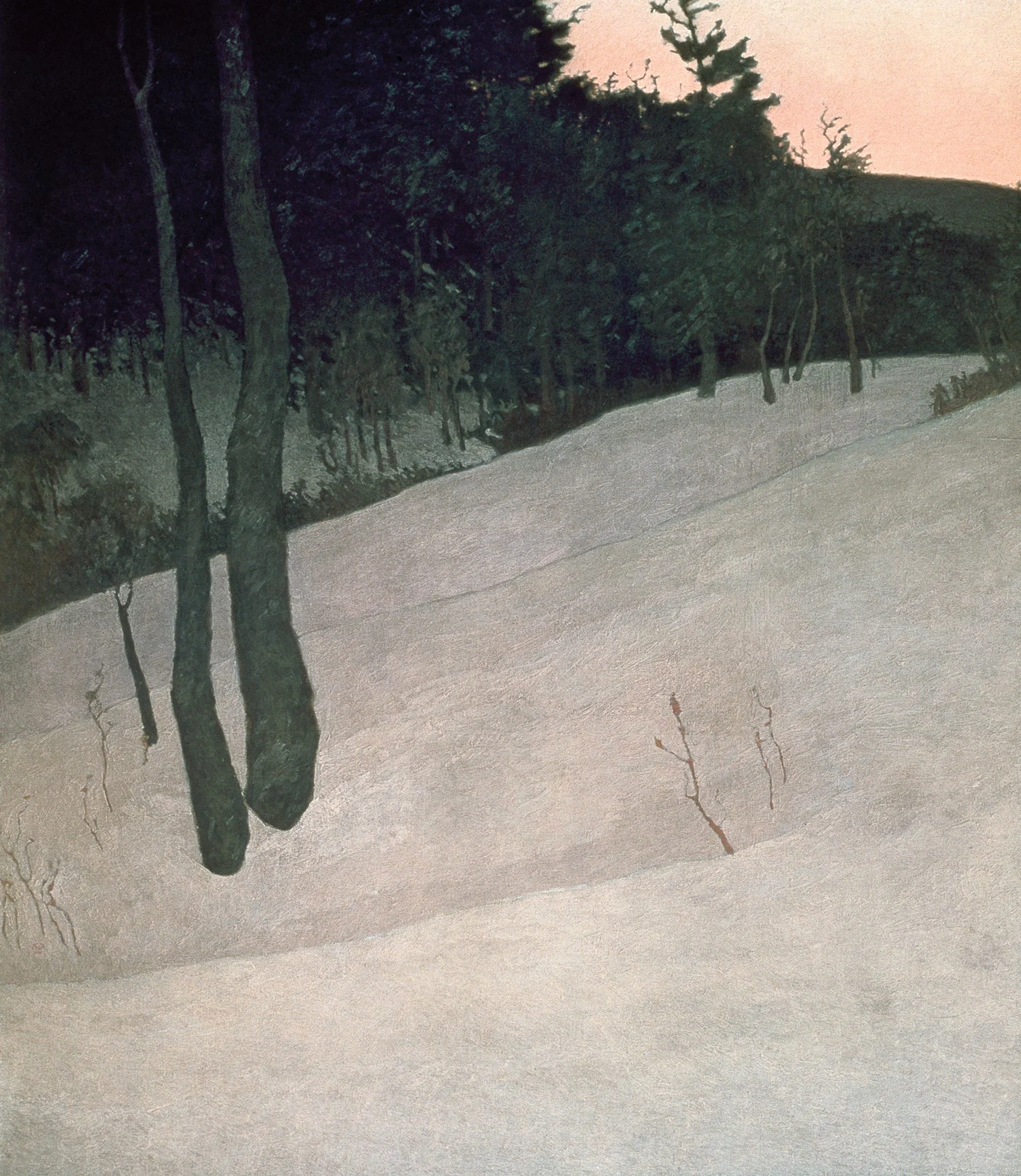
Winter Evening. Courtesy of Russell Chatham
Other painters imitate the paintings of his other seasons. I’m not aware of anyone even trying to imitate the winter paintings.
Greatness is comfortable in, and drawn to, his presence, just as he in turn is drawn to great country. He’s fished Alaska a dozen times, British Columbia 16 times, the Florida Keys 18 times, the Great Lakes 14 times, New Zealand 20 times.
Two of the country’s greatest writers, Jim Harrison and Tom McGuane, were his neighbors in Montana’s Paradise Valley, and fished with him often in Key West. They’ve each known him for over 40 years, a curious knot of supremely talented and driven friends united by the same passions, and by mastery.
McGuane, ever concise, has described Russell in terms of his appetite: “I can see my friend and neighbor, a painter, walking along the high cutbank above the river. This would be a man who has ruined his life with sport. He skulks from his home at all hours with gun or rod. Today he has both.… I feel like a man who has been laid off to be only trout fishing.”
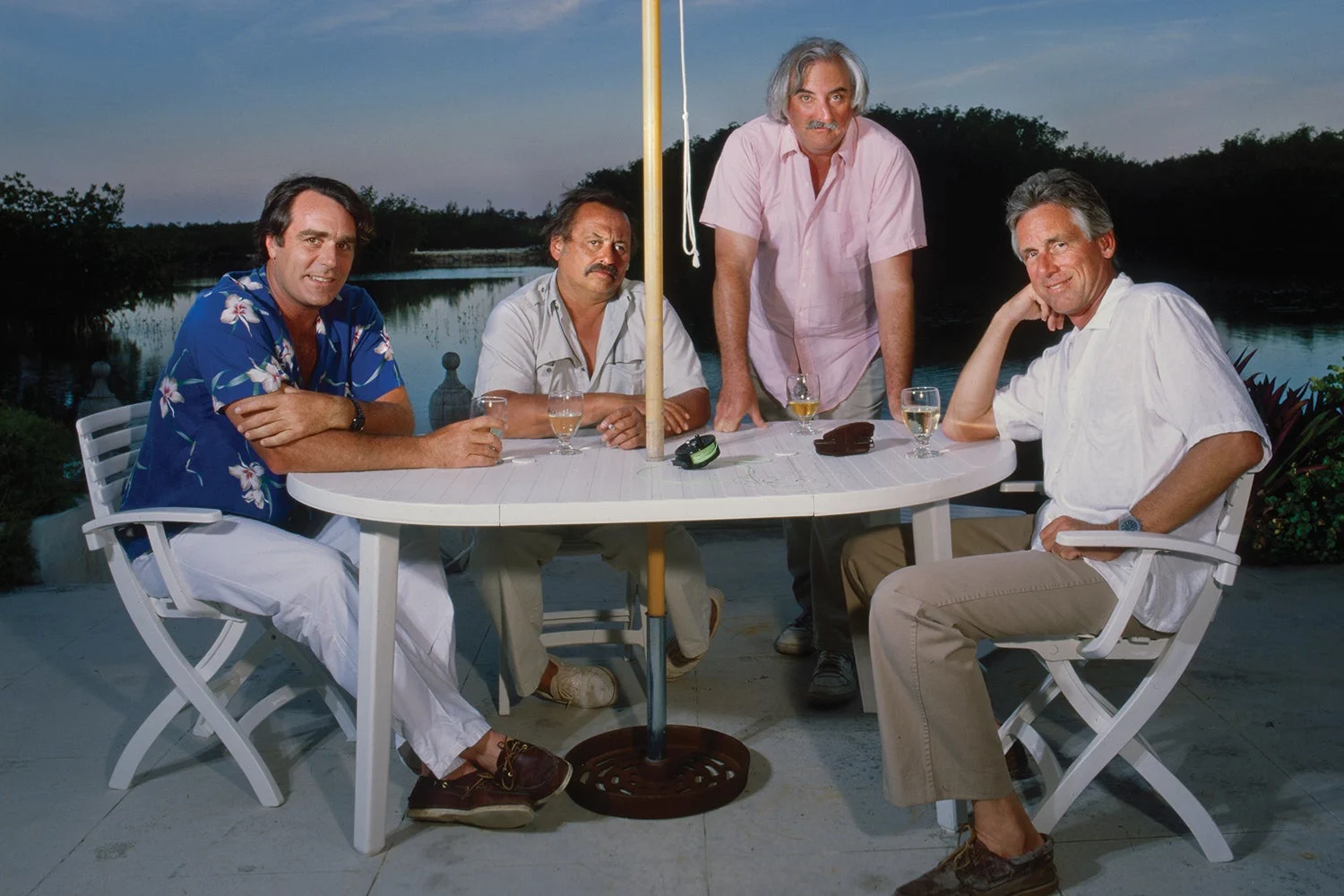
Chatham, standing, with novelists and fellow sportsmen (from left) Guy de la Valdéne, Jim Harrison, and Tom McGuane at Jimmy Buffett’s house in the Florida Keys. Stephen Collector
The Joy of Eating
It’s time for dinner. We walk without a flashlight beneath a waxing half moon through the orchard. At the end of the trail a campfire burns brightly, and just beyond it, there’s the glow of what looks like a little hobbit hut nestled tightly in between trees so large that it seems the house might have been built there centuries ago. Evan greets us at the door.
We start with pig’s ears, the meat as tender and aged as the finest pastrami, on top of some special cabbage that neither of us has ever seen before, the delicious microthin slices of meat folded into the cabbage leaves like little sandwiches. Then asparagus, picked that day, and the wild steelhead perfectly blanched, with some pale yellow aioli. Now Evan moves with a bit more verve, dropping little nuggets of some white-fleshed fish into a tempura batter, to which he’s added sparkling soda, to give it effervescence and carbonation, along with half a can of PBR—“Is that warm or cold?” Russell asks, and Evan smiles, answers, “Cold—sweeter that way, and greater conflict between the hot oil and the batter”—the tempura exploding upward in frills and blossoms like I’ve never seen, golden lava fields from another planet—and atop the hors d’oeuvres he ladles the bright orange roe of steelhead.
Evan and Russell begin talking about their plans for an upcoming fishing trip: striped bass. A guide, Evan’s friend, has promised fish over 5 pounds. Russell smiles and confesses that he has caught over 30,000 stripers that have weighed over 5 pounds. He has a trip to the Atlantic lined up where his host has said they might get into fish weighing 35, 40, even 50 pounds.
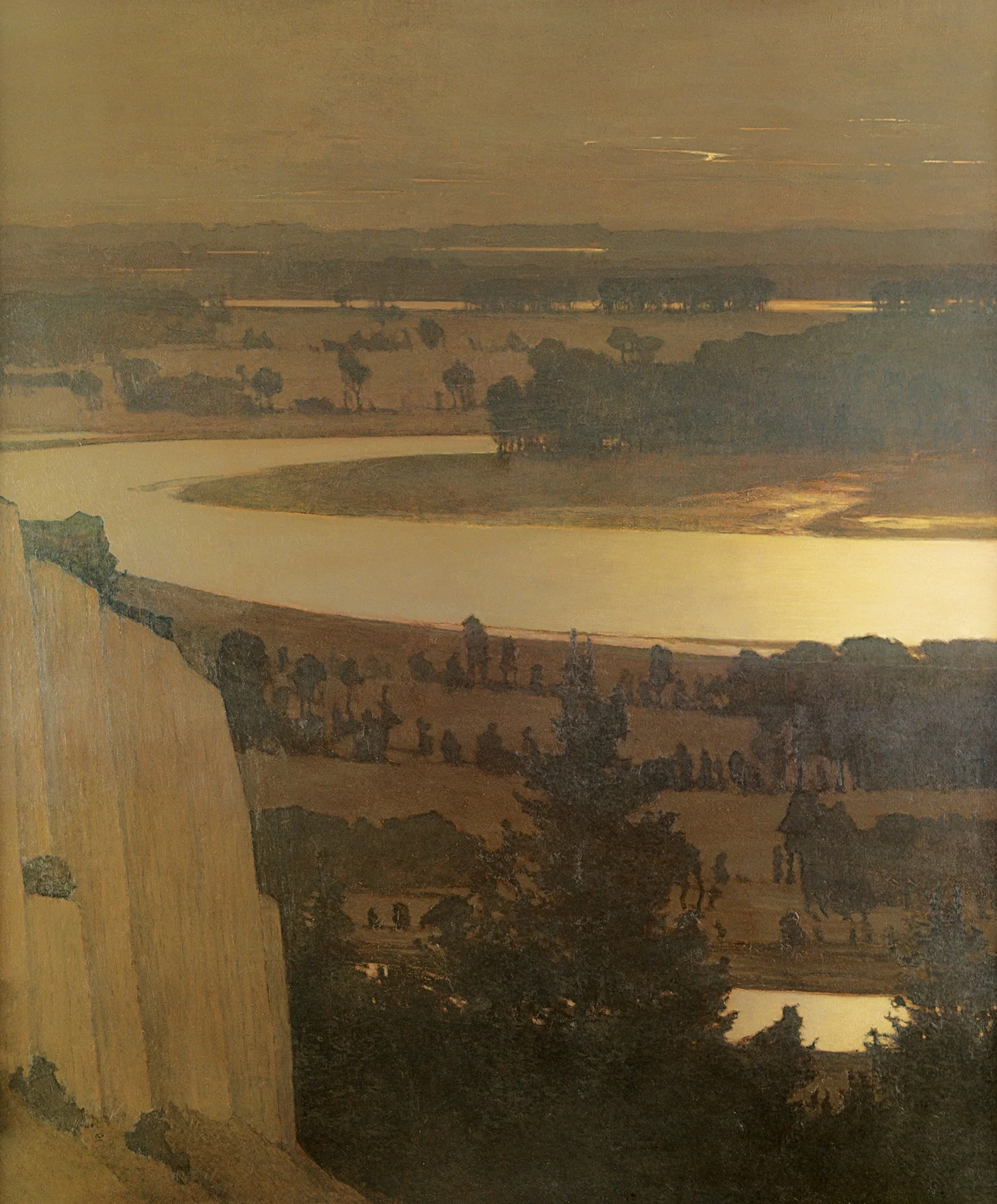
The Seasons, April. Courtesy of Russell Chatham
“That works for me,” says Russell. It needs not saying that across the years, the striped bass are becoming smaller; the giants of yesteryear are fewer and farther between. Russell becomes a little quieter, sinks down into a stillness and silence not unlike that of a great fish finning vertically downward, sinking back down into the cool depths where there is safety and, just perhaps, spiritual renewal.
Evan slices various cheeses on a platter, takes a loaf of special nutty brown bread from the refrigerator, and goes outside with it to prepare the last course. “He built that fire three hours ago for just this toast,” Russell says, like a chessmaster who has pretty much seen all the moves before the game has even begun.
Once you’ve seen Chatham’s paintings, you realize the power of his art: to make you think you have traveled to the place that is so eerily similar to the original.
We say our good-byes and thank-yous, then head back to Russ’s house on the hill for more talk. The idea of art, the theory and practice of it, washes through him at all hours, day and night, like the tides.
He’s been frank in other interviews about that old occupational hazard, depression. The usual risk factors of possessing artistic sensibilities, and being bludgeoned by too many lightless Montana winters, have not abetted his health in this regard, nor the ferocity of his artistic integrity, so expensive to maintain psychologically as well as financially, and yet priceless, in the long run…but he’s working steadily. Not maniacally, but steadily. And he’s home. The salmon no longer run up into the bay as they once did—if a dozen make it back now, it’s an event, where not so long ago at all they ran here by the tens or even hundreds of thousands. But they are there.
Once you’ve seen Chatham’s paintings of the Beartooths and Absarokas and Yellowstone River country, you realize the power of his art: to make you think you have traveled to and inhabited the place that is so eerily similar to the original that the representational can in some delicious and mystical way become almost as real to you as the physical version. A complement to the original.
It took a long time for the paintings to catch on and develop their true value in the art world. During that period, Chatham made his living writing books: The Angler’s Coast, Silent Seasons, Dark Waters, Striped Bass on the Fly, all out of print now but, like his art, owned by collectors.
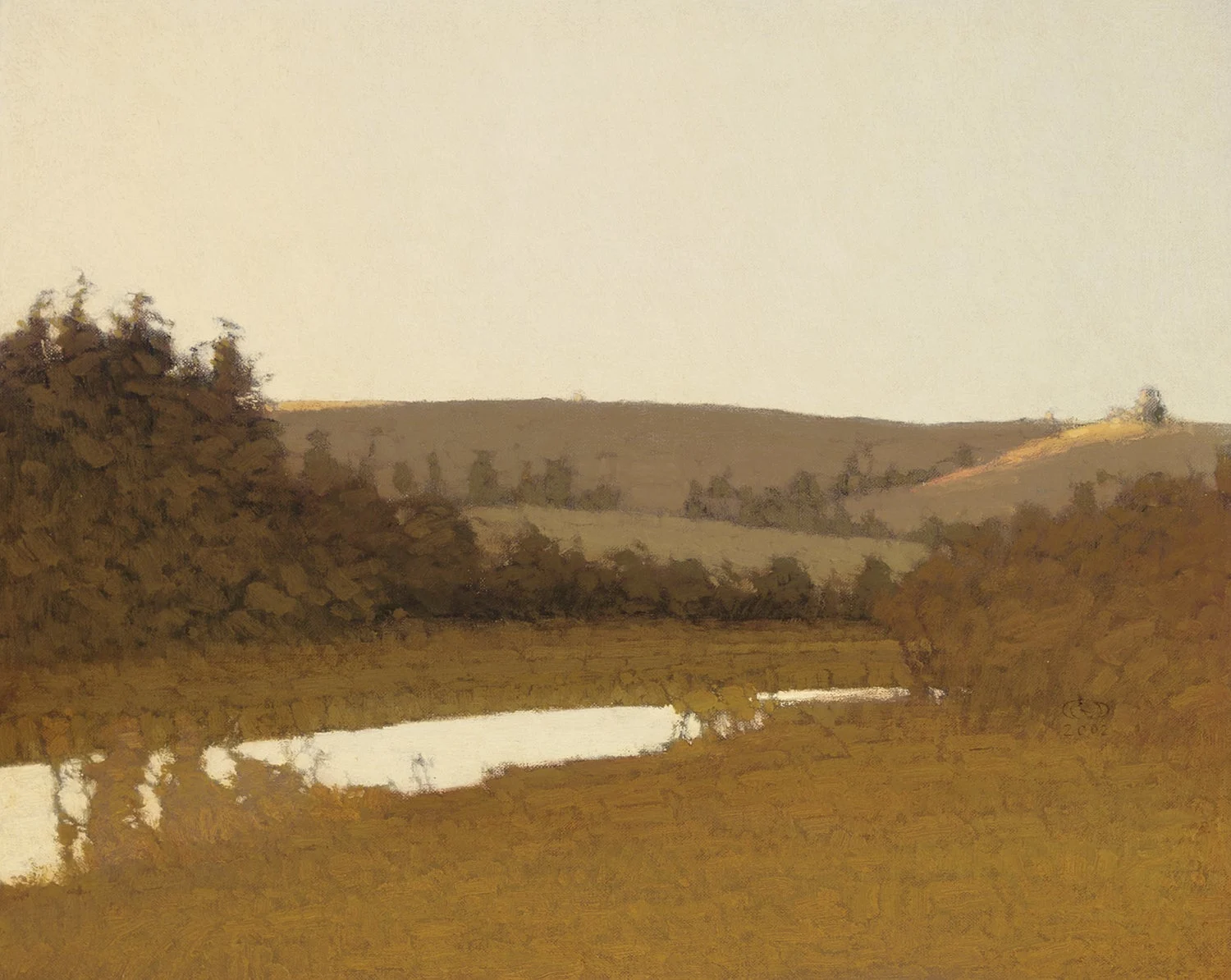
Sweet Grass Creek. Courtesy of Russell Chatham
American Style
The next morning, we breakfast in the sunny little town where his studio is, Inverness, and there’s time, of course, for another fishing story: either a fish story masquerading as a great artist’s credo, or an artist’s story masquerading as a great angler’s credo, I can’t be sure.
For a long time he’d saved to go Atlantic salmon fishing in Iceland and finally made the trip. Sports from all over the world had signed up for this camp—great fishing, a swank lodge. These were high-end anglers, bankers and attorneys and such, not Russ’s kind of folks. Right from the start he got a little crossways with them. Russ had brought his own little light rod with him, stripped down and simple as always, rather than the big European-style double-handed rods favored by the musclemen all around him, circus strongmen who intended to beat up themselves, and the water, and the fish, all day. Russ had a little secret from the Bay Area, the shooting head, which he intended to live or die by.
At first, the host wouldn’t let him do it, and none of the guides would agree to go out with him. They knew he wouldn’t be able to catch any fish, and that would make them look bad, even foolish. “Look,” Russ said, “I’m the one paying you the money. This is how I’m going to do it. I won’t hold you responsible if I don’t catch any fish.”
Still, none of the young guides would take him out: so much ego, at that level of sport. Finally the host found an old guy who would agree to take him. “The oldest guide in the country,” Russ says. “Showed up in a beat-up old truck, eyes my equipment, doesn’t say anything.”
Russell, of course, started catching salmon, from his very first cast. The guide still didn’t say anything, but Russell could tell the man was really interested in what he was doing, and after a while asked him if he’d like to try it. The guide nodded, and for the rest of the day they traded off, with Russell catching a fish, then the guide; then Russell, then the guide. Toward the end of the day, the old guide said to Russell, in broken English, “I know what you are doing.”
“You do?” Russell said.
“Yes,” the guide said. “About 40 years ago, some fishermen from San Francisco came out here. They had what you have. They caught fish, too.”
That evening, some of the other anglers—swells, as Russell describes them—approached Russell to invite him to a party they were holding for one of the other fishermen, who was described as “the best salmon fisherman in Europe,” celebrating his unheard-of accomplishment of catching seven salmon in a day.

Patterson Ranch, III. Courtesy of Russell Chatham
The fellow who invited Russell to the fete then inquired, almost as an afterthought, how he had fared that day, and when Russell said that he had caught “about 25 or so, you’d have to ask my guide”—the man just stared at him, turned, and walked off without saying another word. Russell never did hear where the party was, but the next day, fishing on his own—on the high bluff of a cutbank, the exact opposite of where most anglers would say he should have been—he hooked a big one, and ran up and down the cliff, had to go about 100 yards to land it, while some Spaniards fishing the gravel bar on the other side watched and cheered him; and afterward, they invited him over to have lunch with them, where they lay in the sun and drank good Spanish wine and ate Manchego cheese and the best jamón serrano, Russell says, that he ever had.
In his studio, I get to watch him scrape down and then sand lightly a painting he’s been waiting to finish: sitting with it for days, the way a good writer will sit with an ending, even when he or she is certain. Waiting to be sure—waiting for the delightful vapors, the adrenaline fumes, of completion to wear off—and then waiting a little longer.
The painting—maybe 6 inches by 9 inches—has taken him a month.
“No one spends a month on a small painting like this anymore,” he says. Later he’ll take it to an auction in Great Falls, like a rancher with a prize bull, but carrying it onto the plane like a magazine under his arm.
The blade is rasping, the paint is falling to the bottom of the easel, rasp, rasp, rasp. He blows on the painting as if imbuing it with life, shakes it, puffs on it again, then sands it lightly, holds it out at arm’s length, and is satisfied. And it is beautiful.

